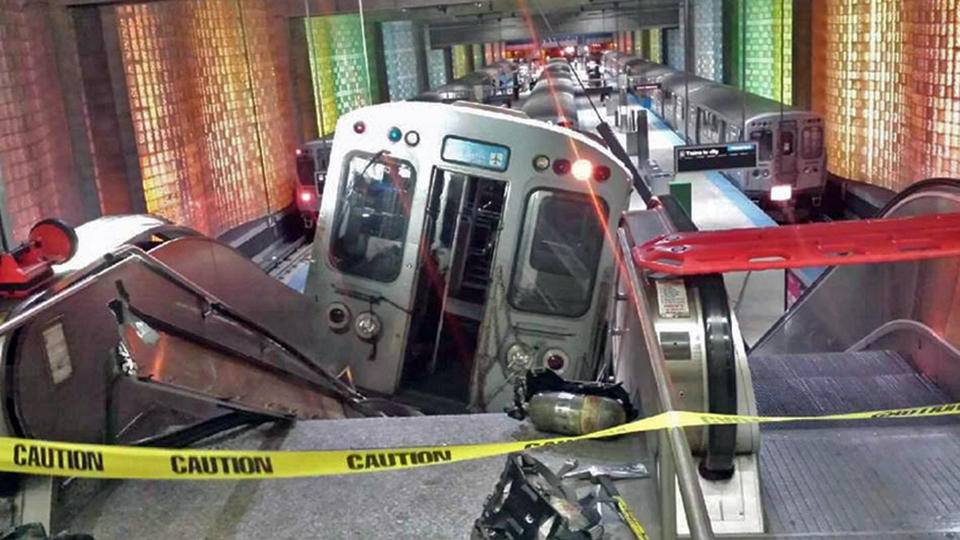Chicago train operator had dozed off on job before
CHICAGO (AP) — The operator of a Chicago commuter train that crashed at O'Hare International Airport acknowledged she dozed off before the accident and told investigators she had fallen asleep at the controls one other time recently — even overshooting a station platform, a federal investigator said Wednesday.
Before the crash, the operator had been running trains on the nation's second-largest public transportation system for just two months. In Monday's accident, which injured more than 30 people, she woke up only as the eight-car train jolted onto the platform and barreled up an escalator leading into the airport. The accident occurred around 3 a.m., as the driver was nearing the end of her shift. The woman had an erratic work schedule and investigators were looking to see if that played a role in her evident fatigue.
"She did admit that she dozed off prior to entering the station. She did not awake again until the train hit," National Transportation Safety Board investigator Ted Turpin said at a final on-site briefing at the airport. Nearby, workers with electric saws and face shields were cutting up the lead train car, sending bright orange sparks flying, as they prepared to remove the wreckage.
Turpin and other officials interviewed the train operator Tuesday and were investigating her training, scheduling and disciplinary history. He described her as cooperative and "very forthcoming."
They were also looking closely at a backup emergency braking system located on the track that was triggered by the train but ultimately failed to stop it from plowing onward. It is possible that the triggering mechanism was not located far back enough to stop the train, which entered the station at a normal speed of about 25 mph, Turpin said.
The train was also equipped with a spring-loaded handle designed to engage the brakes if an operator's hand comes off the controls. The operator told investigators she could not remember if she released it but assumed she continued to grip it even as she fell asleep.
She told investigators she was not taking any medications. Results from a drug-and-alcohol test had not come back yet.
In the earlier episode of drowsiness, in February, she overshot a station platform by a far enough distance that she was unable to safely open the doors for passengers.
"The CTA became aware of that almost immediately and a supervisor admonished her and had a discussion with her," Turpin said, adding that a reprimand was the only step required under the local agency's disciplinary guidelines, which increase in severity after multiple violations.
Turpin said the operator was an extra-board employee, meaning she filled in to cover shifts for regular employees and her hours varied from one day to the next.
"She would call in the morning or at the end of shift to find out when she would work the next day," he said, adding that she had overslept on one occasion and was late for work.
CTA officials refused to comment on the investigation or say whether the agency was reviewing its scheduling guidelines in light of the findings. The union representing the operator has said she was working a lot of overtime recently and was exhausted.
The crash caused about $6 million worth of damage to equipment. There was no estimate for damage caused to the station.
Photos released by the NTSB showed the battered lead car had been thrown at an angle so far up the escalator that someone could comfortably walk beneath it. The exposed escalator machinery was shredded.
Attorneys for several injured passengers have sued the transit agency, alleging negligence.
One of the filings claims passenger Niakesha Thomas, a 22-year-old single mother who was on her way to her job at an airport newsstand, had injuries that left her currently unable to work and support herself and her 1-year-old.
Another suit was filed on behalf of Dalila Jefferson, a 23-year-old security guard who was heading to work at O'Hare and was riding in the first car. Her attorneys said Wednesday that a judge has granted them a protective order to preserve evidence, including all surveillance video and the train operator's personnel file.
A CTA spokesman said the agency does not comment on pending litigation.


